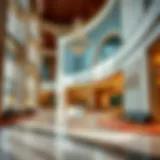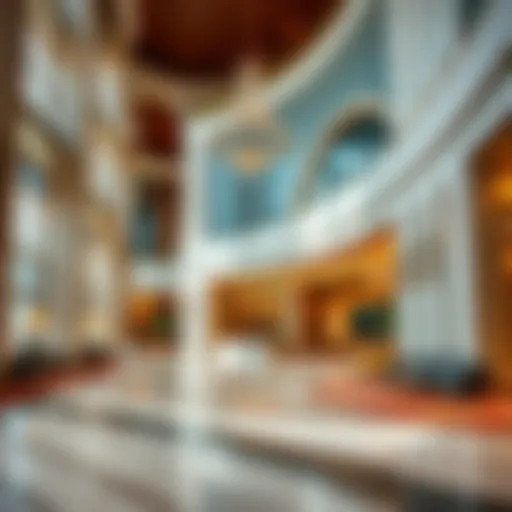Eid Celebrations in Dubai: Culture and Economy
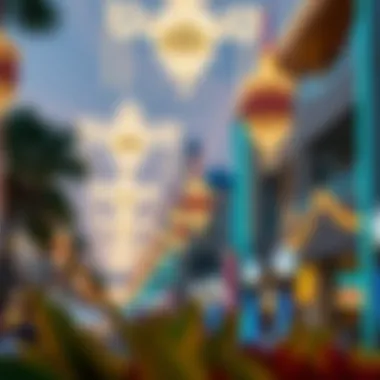

Intro
Eid festivities in Dubai are a sight to behold, merging tradition with modernity in a unique tapestry. The vibrant city pulses with energy as families, friends, and visitors come together to commemorate this significant occasion. The essence of Eid reflects in the communal gatherings, the rich culinary experiences, and the noticeable hustle across the streets. To understand how Eid shapes not just social norms but also economic landscapes, one needs to delve deep into the practices and the experiences people share during this time.
Cultural Significance of Eid in Dubai
In Dubai, Eid is more than just a religious observance; it embodies a fusion of cultural traditions. Families dress in new clothes, often adorned with intricate designs symbolizing prosperity and new beginnings. The aroma of traditional dishes fills the air, with meals often featuring a variety of flavors that pay homage to the region’s historical influences.
Unique Traditions
Participation in communal prayers marks the dawn of Eid, where thousands gather in mosques and open spaces. Here, the spirit of unity thrives, showing respect to the community and the values of sharing and generosity upheld during Ramadan. After these solemn ceremonies, families often visit each other, showering loved ones with sweet treats and warm greetings.
"Eid in Dubai is like a grand reunion. Every corner, every gathering spot radiates joy and warmth, inviting everyone to join the celebration."
The exchange of Eidiyah, or monetary gifts usually given to children, is another cherished practice, promoting happiness and love with each note or coin circulated.
Culinary Experiences
Food plays a central role in Eid celebrations, and Dubai’s culinary scene transforms into a banquet fit for royalty during this season. Restaurants and food stalls offer mouthwatering delights, from fresh dates to extravagant biryanis enriched with spices and flavors. The market stalls are usually alive with the enticing scent of grilled kebabs and sweet pastries such as Knafeh and Baklava. This festive atmosphere not only preserves local culinary heritage but also attracts tourists, further enriching the economic aspect of the celebration.
Economic Impact of Eid
The holidays don't only boost the economy through tourism; they also create a ripple effect across various sectors. Retailers gear up for the Eid Al-Fitr rush, with shops displaying vibrant decorations and promotional sales that beckon local shoppers and tourists alike.
Tourism Surge
The influx of visitors during Eid is notable. Hotels are often fully booked, with tourists eager to partake in the region’s remarkable celebrations. Local businesses, from handmade crafts to luxury goods, see increased foot traffic as many look for gifts and memorabillia. This festive period highlights just how entwined culture and economy are in a place like Dubai.
Community Events and Activities
Various community events also pop up, ranging from music festivals to fireworks displays that blanket the sky. These activities not only entertain but also foster a sense of belonging and unity among residents and visitors. Furthermore, public parks and recreation spaces become vibrant hubs filled with laughter and activity, as families gather to celebrate together.
In summary, Eid celebrations in Dubai embody both a rich cultural heritage and a robust economic narrative. Understanding the depth and importance of these festivities reveals how integral they are to the ongoing development of the region, bridging community and commerce seamlessly together.
Understanding Eid: Cultural Significance
Eid is not just a mere holiday; it represents the essence of community, faith, and a unifying culture. It showcases the rich tapestry of traditions that have evolved through centuries, shaping the identity of Muslim communities from diverse regions. In Dubai, this significance is magnified by the city’s unique blend of cultures and religions, offering an intriguing backdrop to the celebration.
Over the years, Eid has gradually transformed into a grand event that goes beyond religious rituals, intertwining economic elements that impact local businesses and the broader economy. The festive atmosphere during this time presents opportunities for investors, homebuyers, and real estate agents to witness how such cultural events significantly affect property values and community dynamics.
Religious Context of Eid
At its core, Eid is deeply rooted in Islamic traditions, signifying a period of reflection, gratitude, and communal harmony. There are two major forms of Eid celebrated in the Muslim world: Eid al-Fitr, marking the end of Ramadan, and Eid al-Adha, commemorating the willingness of Ibrahim to sacrifice his son as an act of obedience to God. Each of these holidays holds a distinct significance. For instance, Eid al-Fitr emphasizes giving thanks for the strength shown during fasting and encourages generosity through zakat, or charity.
This cultural backdrop also influences the various festivities observed in Dubai. Emphasis is placed on community gatherings, prayers in mosques and open spaces, and sharing meals with family and friends. The religious aspect is not merely symbolic during these celebrations; it is very much felt in the heartfelt greetings exchanged among people, evoking a sense of belonging.
Eid Traditions in Various Cultures
While the core tenets of Eid remain consistent across the globe, traditions can vary widely, providing a rich mosaic of practices that highlight local customs.
- In South Asia, for instance, it is customary to begin the day with a special prayer followed by a festive meal that often includes biryani and sweet treats such as sheer khurma, rich with dates and nuts.
- In Turkey, Eid is celebrated with a focus on familial bonds, where the younger ones kiss the hands of their elders as a sign of respect, followed by shared meals that bring families together.
- In the Middle East, the celebration often integrates the exchange of gifts and the preparation of lavish feasts, an extension of Dubai’s opulent lifestyle. This reflects in the local market trends, where retail and hospitality sectors thrive during Eid, catering to the surging demand for unique experiences and products.
Being aware of these traditions adds a layer of depth when investing in real estate around this period. The demand for vacation rentals spikes, as more people flock to cities like Dubai to join family or take part in community celebrations, creating an interesting landscape for potential investors.
"Understanding the cultural significance of Eid is crucial for those looking to engage with the local community and capitalize on the economic opportunities that arise during this festive period."
In understanding Eid’s cultural significance, it becomes evident that the holiday serves not only as an observance of faith but also as a catalyst for economic activity and community bonding. Hence, for investors and stakeholders, grasping these dynamics is essential for making informed decisions.
Eid Celebrations in Dubai: An Overview
Eid celebrations in Dubai offer a vibrant showcase of cultural significance, acting as a mirror reflecting the city's diverse heritage and economic vitality. The importance of this topic lies not only in the festivities but also in understanding how these celebrations bolster the social fabric and economic activity of the region. From public events to family gatherings, Eid serves multifaceted roles— fostering community spirit while also attracting international visitors eager to partake in the unique customs and culinary delights.
Historical Background
Eid, a festival deeply rooted in Islamic tradition, commemorates the end of Ramadan, the holy month of fasting. Its historical journey is marked by resilience and adaptation as the global context around it has evolved over centuries. In Dubai, Eid celebrations have transformed alongside the city's rapid growth and urban development. Early observances were often local, intimate gatherings, typically featuring prayers at mosques and simple family meals.
As Dubai embraced modernization, these customs began to expand. The introduction of large-scale festivals during Eid, such as entertaining markets and public concerts, started drawing in residents from all walks of life and tourists from around the globe.
The culmination of these historical changes is visible today in the grandeur associated with Eid celebrations, where tradition meets modernity. Events taking place at iconic locations like the Burj Khalifa and Dubai Mall symbolize both the city’s legacy and its dynamic present.
Impact of Dubai's Diversity
Dubai's cosmopolitan nature adds layers of richness to its Eid celebrations. Home to a mosaic of cultures, the city blends a multitude of customs and traditions, allowing for a truly unified experience during this festive period. This diverse backdrop fosters an expansive array of events, where different communities come together to share their unique practices, creating a melting pot of celebration.
The economic implications are noteworthy. Businesses often align with these multi-cultural festivities by offering special promotions, further driving consumer spending. This cross-cultural engagement not only optimizes the outreach for various retail outlets but also enhances the experience for visitors who marvel at the variety.
Some highlights include:
- Culinary Variety: The influx of expatriates brings a delightful array of international cuisines served during Eid, from traditional Emirati dishes to South Asian and Western culinary delights.
- Cultural Performances: Local theaters and public venues showcase performances that embody both artistic heritage and innovative modern interpretations, attracting audiences from different cultural backgrounds.
"In Dubai, Eid is not just a festival but a celebration of unity in diversity. Everyone feels the spirit, be it through shared meals and events or simply by enjoying the festive décor around the city."
Overall, understanding Eid celebrations in Dubai through these lenses reveals not just a short-lived festival, but rather a complex interplay of culture, community, and commerce that leaves a lasting impact on the city’s identity and economic landscape.
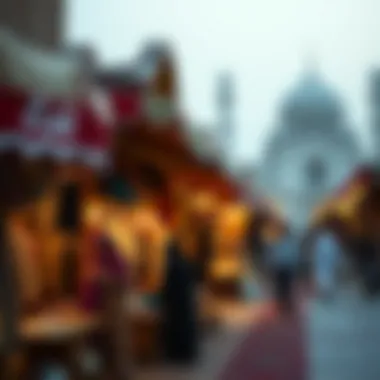

Community Events and Activities
Community events and activities play a crucial role in the celebration of Eid in Dubai, bringing together families, friends, and visitors to share in the joy and spirit of the occasion. These gatherings foster a sense of belonging and unity, bridging gaps between diverse cultures that populate the city. During Eid, community events also serve as an outlet for local businesses to showcase their offerings while promoting the unique cultural heritage of the region.
Public Celebrations and Festivals
Music and Dance Performances
Music and dance have a unique ability to connect people across different backgrounds, and during Eid, they play a central role in public celebrations. Various performances ranging from traditional Arab music to modern flair showcase not just artistic talents but also reflect the city’s multicultural identity. These performances are often held in parks and community centers, creating lively spaces where everyone can participate.
One key characteristic of these performances is their accessibility. They attract large crowds of people, not only from the UAE but from all corners of the globe. For many, it is a delight to experience spontaneous energy through dance or feel the rhythm of live music. This offering serves as an excellent platform for cultural exchange, providing insights into the traditions representative of the many communities living in Dubai.
However, it does come with some challenges. With the high demand for performances, coordination and planning can sometimes be difficult for organizers. Still, the advantages of connecting people and celebrating a sense of togetherness far outweigh the drawbacks.
Fireworks Displays
Fireworks displays are another spectacular highlight of Eid celebrations in Dubai. They light up the night sky, creating a visual spectacle that draws thousands of onlookers. This aspect of the celebration not only symbolizes festivity but also marks the grand conclusion of holiday gatherings. A big moment of attraction, these displays are often synchronized to music, offering a sensory experience that many attendees associate with joy and celebration.
What makes these fireworks particularly special during Eid is the communal experience they provide. They are usually conducted in prominent locations, where families and friends gather to enjoy them together. This collective viewing fosters a feeling of unity and brandishes a sense of pride among residents.
However, newcomers to the city might overlook safety protocols if they are not familiar with the practices. To ensure enjoyment and avoid mishaps, it’s crucial for everyone to be well-informed about the schedule and viewing locations.
Cultural Exhibitions and Art
Local Artisans and Crafts
Supporting local artisans and crafts during Eid celebrations provides a platform for showcasing the rich cultural heritage of Dubai and the wider UAE. This segment of the celebrations emphasizes not only the creativity but also the economic aspect of the community. Local artisans set up stalls displaying traditional handicrafts, artworks, and souvenirs that reflect the region's history and identity.
The beauty of featuring local crafts lies in their uniqueness. Unlike mass-produced items, these handmade works tell a story, often linked directly with the traditions of the community. This allows visitors and residents alike to appreciate and, if they wish, take home a slice of Emirati culture. This approach also nurtures local economies and encourages sustainability.
Nevertheless, a potential downside is that smaller artisans might struggle to compete with larger entities during peak season, especially with increased tourism during Eid. However, the celebration of local craftsmanship embodies an appreciation for quality over quantity, drawing consumers who value the authenticity of their purchases.
Traditional Fashion Shows
Traditional fashion shows are another beloved component of the Eid festivities in Dubai. These shows highlight the beauty and heritage of Emirati and Gulf fashion, featuring designs that range from intricate embroideries to bold modern interpretations. Attendees often look forward to these runway displays, where culture meets contemporary style, reflecting how fashion is ever-evolving.
The charm of traditional fashion shows lies in their visual storytelling. Each piece can narrate a rich background about its origins and the artisans who crafted it. This not only promotes local designers but also digs deep into the cultural roots of the community.
Despite the allure, it is essential to consider that such events can be expensive to produce and attend. However, the cultural significance and the potential for businesses to gain exposure creates a mutually beneficial atmosphere where art and commerce can thrive.
Community events during Eid in Dubai serve not just as celebrations but as platforms for enriching social bonds and displaying the city's cultural diversity.
Culinary Delights during Eid
Eid is not just a time for spiritual reflection and connection; it’s a feast for the senses, particularly when it comes to food. The Culinary Delights during Eid section illustrates how essential food is to the celebration of Eid in Dubai. With a melting pot of cultures represented in this vibrant city, the culinary experiences are diverse, pushing the boundaries of traditional dishes while also emphasizing the importance of community and sharing during this holiday.
Traditional Dishes and Sweets
Popular Eid Dishes
The heart and soul of Eid meals can be found in the Popular Eid Dishes served across Dubai. These dishes are not only about nourishment but also symbolize unity, family, and tradition during the festive period. Varied regional dishes such as Mansaf, a Jordanian dish of lamb and rice, or Kabsa, a spiced rice dish often served with chicken or lamb, are just the tip of the iceberg. Their key characteristic lies in the rich spices, offering a palette of flavors that reflect the heritage of the regions from which they originate.
Moreover, the preparation of these meals is often a communal affair; families come together, sharing recipes passed down through generations. This communal aspect is particularly beneficial as it strengthens family ties and allows for a bond among communities. However, the availability of such dishes may vary, depending on local markets, and this can be a disadvantage during the holiday rush.
Festive Sweets and Beverages
On the sweeter side, Festive Sweets and Beverages are an integral part of the celebrations. Desserts like Maamoul, tiny date-filled cookies, and Kunafa, a decadent pastry soaked in syrup, mark the culmination of festive meals. The key characteristic of these sweets is their use of local and natural ingredients, which not only appeal to the senses but also highlight the resource-rich environment of the region.
These delightful treats serve as a perfect way to connect people during gatherings, often sparking conversations over cups of Arabic coffee or tea infused with spices. The unique feature of such sweets is their artisanal craftsmanship, showcasing skilled bakers who take pride in their creations. However, health-conscious individuals may find some of these items laden with sugar and calories, presenting a trade-off that many grapple with during the festivities.
Dining Experiences and Events
Restaurants Offering Eid Specials
In Dubai, dining options explode during Eid with Restaurants Offering Eid Specials, creating a culinary landscape that attracts locals and tourists alike. These establishments design unique menus that blend traditional Eid dishes with modern twists. This infusion is beneficial not just for tantalizing the taste buds but also for promoting Dubai as a culinary destination.
The unique features of these restaurants often include themed dining experiences, live cooking stations, and even exclusive Karachi-style barbecue options, making the meals an event in themselves. However, with the surge in popularity can come crowds that may detract from the overall dining experience, so it’s advisable to book tables in advance.
Culinary Festivals
Culinary Festivals during Eid present an exciting opportunity for food lovers. These festivals showcase a variety of dishes from aroud the world, bringing together chefs and food lovers in one space. The key characteristic of these festivals is the celebration of cultural diversity; visitors can sample everything from traditional Middle Eastern fare to contemporary international cuisine.
Such events are beneficial not only for local businesses but also for creating an environment where cultures intersect over food. This fusion taste experience adds significant value, making Dubai’s culinary scene even more attractive to tourists. On the flip side, festival-goers may face long queues or crowded venue conditions; thus, early arrival is often recommended to fully enjoy the offerings.
"Food brings us together, creating shared experiences that transcend cultural boundaries, especially during Eid."
In summary, the culinary delights of Eid in Dubai are a reflection of the city's rich cultural tapestry. From popular dishes and sweet treats to vibrant dining experiences, each aspect weaves together threads of tradition, community, and global influence, making Eid not only a time for spiritual reflection but also a splendid culinary adventure.
Eid and the Real Estate Landscape
Eid celebrations, especially in a city as dynamic as Dubai, have significant influence on its real estate market. The festive season brings a surge in activities that affect property values and rental demand. With an increase in tourism and community gatherings, the landscape becomes vibrant, attracting both local and international investors. Exploring these impacts not only highlights the importance of real estate trends during this period but also illustrates how Eid contributes to Dubai's economic growth.
Real Estate Trends During Eid
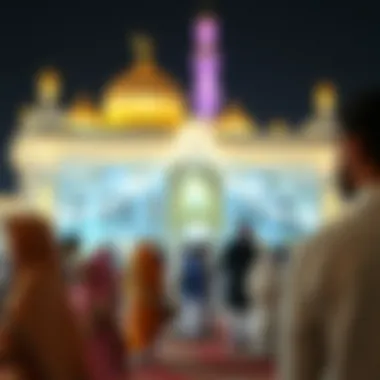

Impact on Property Values
During Eid, the real estate market often experiences fluctuations in property values. People are eager to invest in homes and luxury apartments, as the festive spirit tends to enhance market confidence. Properties in prime areas such as Downtown Dubai and the Palm Jumeirah see heightened interest due to increased foot traffic and festive activities. The unique feature of this period is the spike in property appreciation, often propelling sellers to increase their asking prices, knowing buyers are more willing to pay for a piece of the vibrant celebration.
- Key Characteristics: Increased demand and festive ambiance play a pivotal role. The month's market dynamics reflect not just the seasonal high but also the underlying resilience of Dubai’s real estate sector.
- Advantages: For investors, timing the market around Eid can mean securing properties at raised prices, while buyers can benefit from competitive market offerings with unique property features highlighted during open houses or community events.
Increase in Demand for Rental Properties
Eid also significantly influences the rental market, resulting in an uptick in demand for short-term and long-term rentals. Families and tourists flock to Dubai, seeking accommodations that allow them to immerse in the celebratory atmosphere. This seasonal increase essentially creates a dual opportunity: for property owners looking to capitalize on high occupancy rates and for renters searching for distinctive experiences during their stay.
- Key Characteristics: The surge generally targets furnished apartments or villas, as many travelers prefer staying in homes over hotels for a more personal touch.
- Advantages: Landlords can expect greater rental income during this festive period. However, potential drawbacks include possible wear and tear from constant occupancy and the necessity for effective management to maintain property upkeep.
Investment Opportunities during the Holiday
Emerging Neighborhoods
Emerging neighborhoods in Dubai often see a boost in visibility during Eid, as local events gain traction, drawing attention to previously less explored areas. The appeal of these neighborhoods is largely fueled by new developments offering modern amenities and lifestyle benefits, contributing to their growth.
- Key Characteristics: They generally feature more affordable investment opportunities without compromising on quality or accessibility.
- Advantages: Investors can diversify their portfolio with lower entry costs while providing essential services to the growing resident populations who are drawn by the celebrations.
Luxury Real Estate Market
On the other hand, the luxury real estate market performs robustly during Eid, catering to high-net-worth individuals celebrating the festive season in style. These properties are often located in high-demand zones that provide extraordinary views and premium facilities, setting them apart as an excellent choice for investment.
- Key Characteristics: The luxurious residences often have special Eid decorations or themed events that attract buyers interested in properties aligned with their lifestyles.
- Advantages: For investors, the prestige associated with owning unique luxury real estate can lead to substantial long-term capital gains, making it a favored option for those looking to partake in Dubai’s upscale market segment.
The intersection of Eid celebrations and the real estate landscape in Dubai highlights not just festivities but emerging investment trends that resonate with both local and foreign markets.
In a nutshell, understanding these dynamics not only provides insight into Dubai’s real estate sector during Eid but also offers valuable lessons for investors, homebuyers, and real estate agents aiming to leverage these seasonal shifts for sustainable growth.
The Role of Tourism in Eid Celebrations
Tourism plays a pivotal role in shaping Eid celebrations in Dubai, weaving together diverse cultural experiences that enrich both visitors’ and residents’ festivities. The influx of tourists transforms the atmosphere of the city during this holy occasion, contributing significantly to Dubai's economy while showcasing its vibrant culture. This section aims to articulate how tourism enriches the Eid celebration experience and the multifaceted benefits it brings.
Attracting International Visitors
During Eid, Dubai becomes a melting pot of cultures as international visitors flock to the city. Travelers are drawn not only by the festive atmosphere but also by the opportunity to experience and participate in the local customs and traditions surrounding Eid. Flights from various parts of the world see increased bookings, many leveraging the festive days to explore the blend of modernity and tradition unique to Dubai.
This surge in tourists creates a lively economic ripple effect. Shops, restaurants, and attractions see increased foot traffic, leading to an uptick in sales and revenue. Tour operators often curate special packages that guide visitors through traditional markets, mosque visits, and family-friendly events, making the experience accessible and enjoyable.
Tourism Industry Growth during Eid
Hotel Occupancy Rates
The Eid period sees hotel occupancy rates skyrocketing to impressive levels, often nearing full capacity. Many hotels make special arrangements to cater to families and groups celebrating Eid, providing tailored services such as private dining experiences and traditional decor. This focus on hospitality enhances guest experiences, drawing in both returning visitors and new ones eager to immerse themselves in the local culture.
Key characteristics of these occupancy spikes include:
- Influence of Packages: Many hotels offer promotion deals centered around Eid festivities, which entice guests to book stays.
- Cultural Ambiance: Properties often emphasize local customs, with decorations and events that reflect the spirit of Eid, enhancing the customer experience.
However, it is important to note that while high occupancy can indicate success, the limited availability of accommodations can sometimes lead to inflated prices, potentially deterring budget travelers.
Visitor Spending Patterns
Visitor spending during Eid showcases an interesting dynamic. Tourists tend to spend generously on gifts, dining, and experiences, treating themselves during this cosmopolitan celebration. Food and retail sectors benefit substantially as visitors indulge in traditional clothes, souvenirs, and festive meals.
The unique feature of these spending patterns is their seasonal peak, where:
- Gifting Culture: Many tourists engage in the tradition of giving gifts, which leads to increased sales across various sectors.
- Culinary Exploration: Visitors frequently dine out or seek out local food during Eid festivities, thus supporting local vendors and restaurants.
Yet, it is crucial to recognize that once the festivities end, a decline in spending often follows, highlighting the cyclical nature of tourism tied to seasonal events like Eid.
"Tourism during Eid transforms Dubai; not just a city but a cultural hub during a time of joyous celebration, connecting people across the globe in shared experiences."
In summary, the role of tourism in Eid celebrations in Dubai is profound. It not only attracts international visitors but also bolsters the local economy and fosters a spirit of unity through shared cultural experiences. Investors and homebuyers interested in Dubai’s real estate market should keep an eye on such seasonal fluctuations, as they reflect the broader economic health of the region and present opportunities in hospitality and retail sectors.
Social Cohesion and Community Spirit
In Dubai, the spirit of Eid transcends mere festivities; it lays the groundwork for social cohesion and a robust community spirit. During this significant occasion, the vibrancy of the city is brought to life, not just through its lights and fireworks, but primarily through the uniting force of shared experiences and activities. This is crucial, especially in a metropolis that boasts such cultural diversity, where people from various backgrounds come together to celebrate common values. Emphasizing social cohesion ensures that the essence of Dubai as a melting pot is preserved, creating an inclusive environment that fosters harmony and collaboration among its residents.
Charitable Activities and Contributions
Donations and Aid Initiatives
One of the hallmarks of Eid is the importance placed on charity. Donations and aid initiatives play a vital role in the overall celebration. During Eid, Zakat, a form of almsgiving treated as a tax in Islam, is commonly observed. This practice underlines a key characteristic of Eid; it’s a time for reflection and giving back to those less fortunate. By contributing to food drives or financial support for families in need, residents actively participate in making the holiday not only festive but meaningful.
The unique feature of these initiatives is their ability to touch lives directly. While the advantages are clear—assisting those in distress and fostering a sense of community—the challenge often lies in creating awareness. Many initiatives may go under the radar, missing out on potential contributors who could amplify their impact.
Community Support Programs
Community support programs further exemplify the spirit of communal caring during Eid. Through various local organizations and grassroots movements, residents come together to offer assistance to those facing difficulties, be it financial, emotional, or logistical. The key characteristic of these programs is their focus on local needs and community involvement, making it a popular choice for residents. The programs not only focus on the immediate aid but also on encouraging sustainability within communities, which can lead to prolonged support throughout the year.
A unique feature of community support programs is their adaptability. They can quickly respond to situational needs, such as providing meals, hygiene kits, or even temporary housing. However, it is crucial to recognize the potential disadvantage, which is often the reliance on volunteer labor that may not always meet escalating demand.
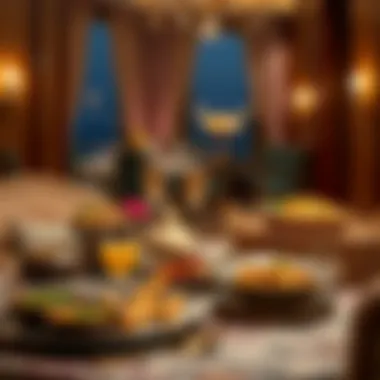

Fostering Unity Among Residents
Intercultural Celebrations
Intercultural celebrations during Eid showcase Dubai’s landscape as a dynamic scene where diversity thrives. These events, often organized at community centers or public parks, bring together individuals from various backgrounds to engage in traditional games, culinary exchanges, or storytelling that highlights different cultures. One key characteristic of these celebrations is their emphasis on a joyful exchange, where sharing customs and traditions is not just encouraged but celebrated. Such events prove to be beneficial, as they enhance understanding and appreciation among different ethnic groups.
The unique aspect of intercultural celebrations is their informal setting; people can connect over food, music, or dance without the pressure of formalities. The main advantage here is that they help dissolve barriers, paving the way for friendships and collaborations that might not have formed otherwise.
Strengthening Community Bonds
Strengthening community bonds is at the heart of Eid celebrations in Dubai. As families gather to observe this significant occasion, a spirit of brotherhood reverberates throughout the city. The key characteristic of strengthening community bonds lies in shared rituals—be it attending the Eid prayers at local mosques or enjoying communal meals afterward. Such activities help reinforce relationships, fostering an atmosphere of support.
The unique feature of this communal engagement is its multiplier effect; when one person participates, it encourages others to join, leading to larger gatherings and enhanced community spirit. However, while the desire to strengthen bonds is evident, challenges can arise from differing expectations among communities, making it essential to navigate the varying approaches to unity carefully.
In essence, the collective movement during Eid in Dubai promotes values that extend beyond simply celebrating a holiday; it cements the identity of a united community, regardless of its diverse makeup.
Sustainability and Eco-Friendly Practices
Sustainability and eco-friendly practices during Eid are becoming an increasingly important focus for communities in Dubai. As the city grows and celebrates diverse cultural traditions, being mindful of the environment is crucial. Incorporating sustainable practices not only enhances community engagement but also has long-lasting benefits for both residents and visitors alike. The combination of cultural festivities with environmental responsibility is an essential theme to explore.
Green Initiatives during Eid Celebrations
Reducing Waste
Reducing waste during Eid is a pivotal strategy that benefits the environment and community. Events tend to generate a lot of excess materials from food packaging to decoration supplies, contributing to pollution. By implementing waste-reduction initiatives, Dubai can minimize its ecological footprint. For instance, local government and organizations encourage responsible consumption through several means—like promoting the use of reusable utensils and plates during community feasts. This not only cuts down on disposable waste but also educates the community about sustainable habits, an aspect that many are beginning to value.
Key Characteristics of Reducing Waste:
- Encourages local engagement
- Reduces environmental impact
One significant feature of waste reduction is its focus on education. Knowledge is a powerful tool. This educational approach equips individuals with the skills needed for mindful consumer choices, making them the captains of their environmental journeys.
Promoting Local Produce
Promoting local produce during Eid not only supports the economy but also fosters community ties. When residents opt for locally sourced ingredients in their festive dishes, it reduces carbon emissions associated with importing foods. This practice encourages people to engage with nearby farms and artisans, boosting local economies while enjoying fresh, quality products.
Key Characteristics of Promoting Local Produce:
- Strengthens local businesses
- Reduces transportation emissions
A standout feature is how it can galvanize community pride. People feel more connected to their environment when they invest in local farming practices. Families and friends often gather to celebrate their cultural heritage, enjoying meals created from local harvests, which elevates the overall experience.
Corporate Social Responsibility and Eid
Businesses Supporting Community Projects
Businesses engaging in community projects during Eid create a significant impact. This aspect of corporate social responsibility fosters a sense of solidarity among residents. When companies take an active role in supporting local initiatives—be it funding charity events or donating resources—the values of Eid transcend into meaningful actions. It showcases the spirit of giving that Eid embodies, attracting more visitors and enhancing Dubai's reputation as a vibrant, caring community.
Key Characteristics of Businesses Supporting Community Projects:
- Encourages partnerships between public and private sectors
- Fosters localized economic growth
What makes this aspect particularly compelling is its ripple effect. Positive initiatives can lead to increased customer loyalty as organizations openly demonstrate their commitment to the community.
Sustainable Event Planning
Sustainable event planning during Eid is crucial for minimizing the environmental impact of large gatherings. Organizers must consider eco-friendly measures—from waste management to energy-efficient lighting. By doing so, they create memorable experiences that leave a positive imprint on the environment. Such planning paves the way for future celebrations, reflecting a commitment to a greener future.
Key Characteristics of Sustainable Event Planning:
- Reduces the carbon footprint of events
- High engagement through green practices
The unique feature of sustainable event planning lies in its capacity for innovation; it pushes organizers to rethink traditional practices, resulting in novel methods of celebration that resonate with the modern audience. This duality of responsibility and festivity underscores Dubai's forward-thinking ethos.
"The importance of cohesive community bonds and environmentally sound practices during festive occasions like Eid cannot be overstated; they are integral to a thriving, sustainable city culture."
Overall, the combination of green initiatives and corporate responsibility during Eid provides a holistic approach to celebration that respects the past while looking towards a sustainable future.
The Future of Eid Celebrations in Dubai
As we look ahead, the evolution of Eid celebrations in Dubai stands not only as a reflection of community values but also as a testament to how traditions adapt with the passage of time. The shifting dynamics of society and technological advancements significantly influence how Eid is celebrated. It's pivotal to recognize that these future celebrations will maintain the core essence of the occasion, while also embracing modern aspects that reflect the city's mosaic of cultures.
In the coming years, Eid celebrations in Dubai are likely to see enhancements in community engagement, sustainability initiatives, and digital integration. From local markets flourishing with artisans showcasing their crafts, to digital platforms enabling virtual participation for those unable to attend in person, innovations can align the joyous spirit of Eid with the latest trends and technologies.
Trends Shaping Eid in the Coming Years
- Technological Integration: One can expect tech-savvy solutions to play a major role. Virtual reality experiences that allow individuals worldwide to feel a part of the festivities could be on the rise.
- Sustainable Celebrations: Growing awareness of environmental issues means that Eid programs might prioritize eco-friendly practices. Markets that promote local produce and zero-waste initiatives could become prominent features.
- Cross-Cultural Collaborations: Dubai’s global essence will likely promote more intercultural mingling during Eid. Events that highlight diverse cultural offerings will help fuse traditions and create new experiences for everyone involved.
In addition, augmented reality could transform how traditional storytelling unfolds, captivating younger generations while educating them about their heritage and the significance of Eid.
Evolving Traditions within Modern Context
Traditions are seldom stagnant; they morph over time, adapting to shifting social fabrics. Eid is a prime example of this adaptability. Customized events, driven by community preferences, will likely become more pronounced.
- Local Artisans in Focus: By spotlighting local artisans during Eid markets, Dubai can cultivate a deeper appreciation for traditional crafts in the younger generation. This not only preserves heritage but also provides economic benefits, fostering local entrepreneurship.
- Culinary Innovations: The food landscape during Eid may also see inventive twists, combining traditional dishes with modern flavors and presentation styles, appealing to diverse palates and dietary preferences.
- Community-Centric Initiatives: With an emphasis on social responsibility, future Eid celebrations might incorporate extensive volunteer opportunities and community service elements, bridging gaps between different societal groups.
"Eid represents more than just a celebration; it's a bond that strengthens ties within our diverse community. As we adapt and innovate, we ensure that this bond remains unbroken."
The path forward signifies an exciting time for Eid celebrations in Dubai. By blending cultural richness with contemporary relevance, Dubai must ensure that its unique identity is celebrated, not just by its residents but by visitors from all around the globe.




